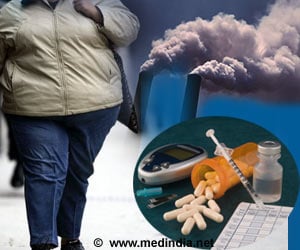Exposure to endocrine-disrupting chemicals (EDCs) is linked to two major public health problems in the world - diabetes and obesity. This was revealed in a scientific statement issued recently by the Endocrine Society.
The new statement is part of the further investigation of the Society’s initial 2009 groundbreaking report that scrutinized the state of scientific evidence on EDCs and the risk posed to human health.According to the statement, EDC exposure is also linked to neurological problems, infertility, hormone-related cancers, and other disorders.
EDCs can mimic, block or -interfere with the body's natural hormones to create many health issues. EDCs can also change the way cells develop and grow by hijacking the body's chemical messengers.
Bisphenol A (BPA) is a well-known EDC, used in the production of polycarbonate plastics and epoxy resins. Other EDCs include phthalates found in plastics and cosmetics, flame retardants and pesticides. These chemicals are so common that most people have been exposed to one or more.
The society makes these observations based on emerging evidence.
Economic Analysis
The Journal of Clinical Endocrinology and Metabolism has published an analysis of the economic burden of EDC exposure.The study estimated that the chemical exposure most likely costs the European Union $209 billion a year in actual medical expenses and lost earning potential.
Susceptibility of Unborn Babies to EDCs
Researchers have found that the risk is particularly great when unborn babies are exposed to EDCs. Babies exposed to even a small amount of EDCs during the prenatal period have a higher chance of developing obesity later in the life than children who are not exposed to EDCs during the period.Also, some of the chemicals can directly influence beta and alpha cells in the pancreas, fat cells, and liver cells, which could increase risk factors for Type 2 diabetes, leading to insulin resistance and an overabundance of the hormone insulin in the body.
Epidemiological Study
Epidemiological researches also show a connection between EDC exposure in humans with obesity and diabetes. However, the research design did not allow investigators to determine causality."It is clear we need to take action to minimize further exposure. With more chemicals being introduced into the marketplace all the time, better safety testing is needed to identify new EDCs and ensure they are kept out of household goods," Gore said.
In the statement, the Endocrine Society calls for:
- Conducting more studies to establish cause-and-effect relationships between EDC exposure and health conditions.
- Regulation to ensure that chemicals are properly examined for endocrine activity prior to being permitted for use.
- Encouraging ‘green chemists' and other industrial partners to create green products and eliminate EDCs. Green chemistry is an area of chemistry focused on the design of products that minimize the use of hazardous substances.
- Encouraging public and policymakers to keep EDCs out of food, water, and the air.
- Taking measures to protect unborn children from EDCs exposure.
Source-Medindia















